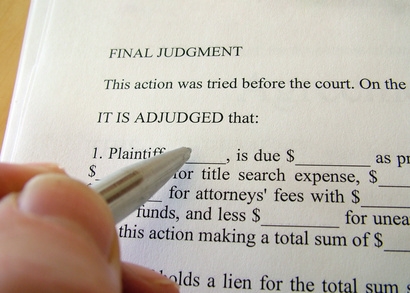The normal course of action when a Florida Court (or a South Florida Court at least in my experience) enters a final judgment is for the clerk to record such judgment in the Official Records of the same County. However, this action by the Clerk does not cause such judgment to attach to real property of the judgment-debtor located in that county. In order for such judgment to automatically become a lien on the judgment-debtor’s real property in any county (including the county where the judgment was entered and recorded by the clerk), is to record a separate certified copy of the judgment in the Official Records.
The current Florida Statute regarding judgment liens on real property is Florida State Section 55.10, and it currently provides as follows,
55.10 Judgments, orders, and decrees; lien of all, generally; extension of liens; transfer of liens to other security.—
(1) A judgment, order, or decree becomes a lien on real property in any county when a certified copy of it is recorded in the official records or judgment lien record of the county, whichever is maintained at the time of recordation, provided that the judgment, order, or decree contains the address of the person who has a lien as a result of such judgment, order, or decree or a separate affidavit is recorded simultaneously with the judgment, order, or decree stating the address of the person who has a lien as a result of such judgment, order, or decree. A judgment, order, or decree does not become a lien on real property unless the address of the person who has a lien as a result of such judgment, order, or decree is contained in the judgment, order, or decree or an affidavit with such address is simultaneously recorded with the judgment, order, or decree. If the certified copy was first recorded in a county in accordance with this subsection between July 1, 1987, and June 30, 1994, then the judgment, order, or decree shall be a lien in that county for an initial period of 7 years from the date of the recording. If the certified copy is first recorded in accordance with this subsection on or after July 1, 1994, then the judgment, order, or decree shall be a lien in that county for an initial period of 10 years from the date of the recording.
The District Court of Appeal in Meadows Development Co. v. Ihle , 345 So.2d 769 (Fla.1st DCA 1977), held that the filing and recording in the county’s official records of either the original final judgment, or a certified copy of that judgment, was sufficient under Section 55.10, Florida Statutes (1969), to create a judgment lien on land owned by the judgment debtor in the forum county.
However, the Supreme Court overturned the District Court and in Smith v. Venus Condo. & Meadows Develop. Co. v. Ihle, (consolidated), 352 So.2d 1169 (1977), held “that Section 55.10, Florida Statutes (1975), as presently written requires the recordation of a certified copy of the final judgment in the county’s official records before a valid judgment lien can be create, and that there is no compliance with the judgment lien statute when recordation of the original judgment alone was recorded in the official records. Reasoning, that at common law, except for debts due the King, the lands of a debtor were not liable to the satisfaction of a judgment lien against him, and consequently, a judgment did not operate as a lien on the real estate of the debtor. Judgment liens on land are statutory liens and their existence depends upon the legal effect of the statute by which they are created. ” citing Protective Holding Corp. v. Cornwall Co., 127 Fla. 252, 173 So. 804, 812 (1937).

